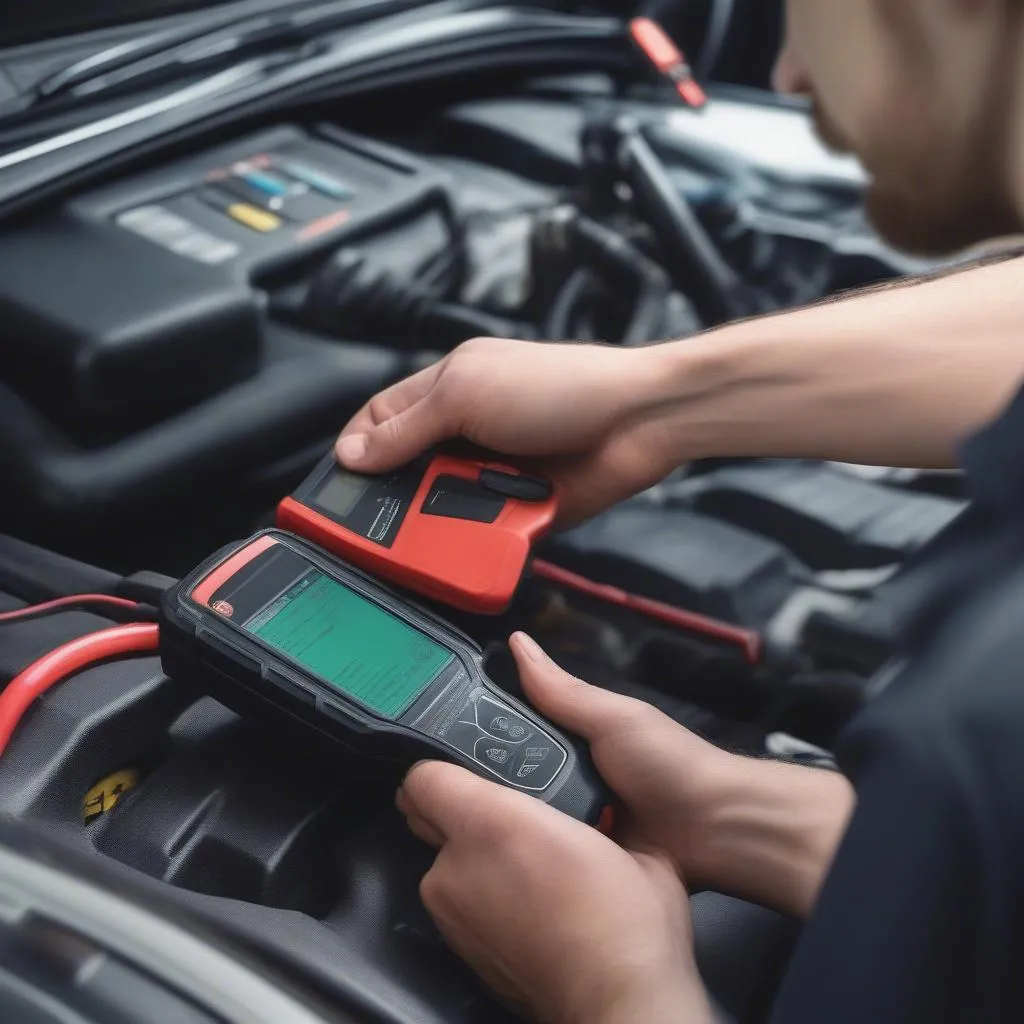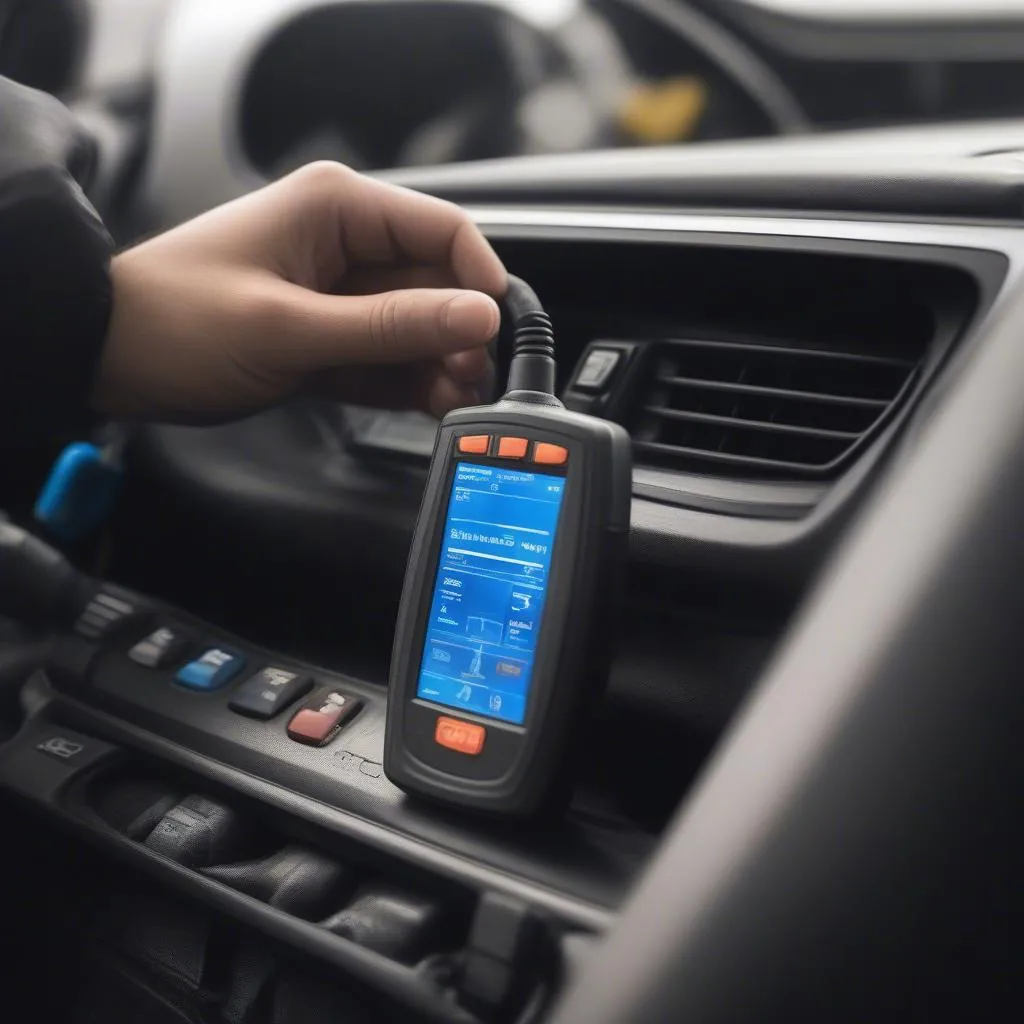You’re cruising down the highway, enjoying your favorite tunes, and suddenly, your Linxup OBD GPS tracker stops working. The screen goes blank, the car feels sluggish, and you’re left wondering what happened. It’s a common issue, and it can be frustrating, but don’t worry. Let’s dive into the potential causes and solutions for this problem.
Understanding the Linxup OBD GPS Tracker and Why It Might Turn Off
The Linxup OBD GPS tracker is a valuable tool for monitoring your vehicle, providing real-time data on its location, speed, and other performance metrics. It connects to the On-Board Diagnostics (OBD) port in your car, allowing it to access vital information. But like any electronic device, it can malfunction from time to time.
Common Causes for Linxup OBD GPS Tracker Turning Off:
- Power Issues: OBD trackers rely on power from your car’s battery. A weak battery, loose connection, or a problem with the OBD port itself can cause the tracker to shut off.
- Signal Loss: The tracker needs a strong GPS signal to function properly. If you’re in an area with poor satellite reception, like underground parking garages, the tracker may lose its signal and shut down.
- Software Glitches: Like any electronic device, OBD trackers can experience software bugs or glitches. These can sometimes lead to unexpected shutdowns.
- Overheating: While not as common, extreme heat can cause the tracker’s internal components to overheat and malfunction.
- OBD Port Problems: A damaged or faulty OBD port can prevent the tracker from receiving power or data from your car.
- Compatibility Issues: Some Linxup OBD trackers may not be compatible with certain car models or operating systems.
- External Interference: Strong electromagnetic interference, such as from a nearby radio transmitter or other electronic devices, can disrupt the tracker’s functionality.
Troubleshooting and Solutions for Linxup OBD GPS Tracker Turning Off:
1. Check for Power Issues:
- Battery Check: Start by checking your car’s battery. A weak battery can cause the tracker to lose power and shut down. You can use a multimeter to check the battery voltage.
- OBD Port Connection: Make sure the tracker is securely plugged into the OBD port. A loose connection can interrupt power flow. Try gently wiggling the tracker to see if the connection is stable.
- Fuses: Examine the fuses related to the OBD port in your car’s fuse box. A blown fuse can prevent the tracker from receiving power.
2. Ensure Strong GPS Signal:
- Location Matters: Move your car to an open area with clear views of the sky to ensure a strong GPS signal.
- Obstructions: Check for any obstructions near the OBD port, such as bulky accessories or items that might be blocking the signal.
3. Software Update:
- Software Update: The Linxup platform might have software updates available for your tracker. Log into your Linxup account, visit the support section, and check for updates.
4. Overheating Prevention:
- Ventilation: Make sure the tracker has proper ventilation. Avoid placing it in areas where it might be exposed to direct sunlight or excessive heat.
5. OBD Port Diagnostic:
- Diagnostic Test: If you suspect a problem with the OBD port, have a mechanic perform a diagnostic test to determine if it is functioning properly. You can use a diagnostic tool, such as the
 European Car Diagnostic Tool, to test the OBD port.
European Car Diagnostic Tool, to test the OBD port.
6. Compatibility Check:
- Compatibility: Ensure that your Linxup OBD tracker is compatible with your car model and operating system. Check the manufacturer’s specifications for compatibility information.
7. Limit External Interference:
- Electronic Devices: Avoid placing the tracker near strong sources of electromagnetic interference, such as radio transmitters or other electronic devices.
Frequently Asked Questions About Linxup OBD GPS Trackers
Can I use the Linxup OBD GPS tracker on any car?
The Linxup OBD GPS tracker is compatible with most gasoline and diesel vehicles manufactured after 1996 in the United States, Europe, and Japan. However, it’s essential to check the manufacturer’s specifications for compatibility with your specific car model.
Is it legal to install an OBD GPS tracker in my car?
In most countries, it is legal to install an OBD GPS tracker in your own car for personal use. However, it’s crucial to check the local laws and regulations regarding privacy and data protection.
What does the Linxup OBD GPS tracker track?
The Linxup OBD GPS tracker monitors your vehicle’s location, speed, driving habits, engine diagnostics, and other performance data.
Why did my Linxup OBD GPS tracker stop working after a software update?
Sometimes, a software update can introduce bugs or glitches that affect the tracker’s functionality. Contact Linxup’s customer support for assistance with troubleshooting software issues.
Let’s Connect!
Need help with setting up your Linxup OBD GPS tracker or have any questions about diagnostics tools? Contact our team of experts on Whatsapp at +84767531508 for 24/7 support. We’re here to assist you!
While most of these solutions should resolve the issue, if your Linxup OBD GPS tracker continues to turn off despite troubleshooting, you might want to consider consulting with a professional technician or contacting Linxup’s customer support for further assistance. You can also check for any specific troubleshooting tips on their website or documentation.
It is essential to keep your Linxup OBD GPS tracker functioning correctly to ensure the safety and security of your vehicle. By understanding the common causes and solutions, you can quickly resolve most issues and keep your tracker working efficiently.
Remember, maintaining regular communication with Linxup customer support is key to staying informed about any updates, software patches, or other important information related to your tracker.
For a visual representation of a common diagnostic tool used for European cars, check out this image:
 OBD Port Diagnostic Tool for European Cars
OBD Port Diagnostic Tool for European Cars
This tool can be helpful in identifying any problems with the OBD port, which could be causing your tracker to malfunction.
